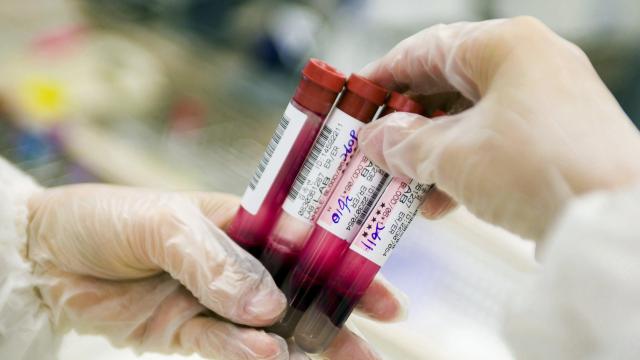Scientists in China say they’re well on their way to developing what would be an important achievement in medicine: a blood test that can detect the early stages of the most common form of lung cancer. In a new study this week, they’ve shown evidence that the test was over 90% accurate in identifying these tumours in samples taken from real life patients. More research, including clinical trials, will be needed before this test will be able to reach the public, however.
The early detection of cancer is often crucial to ensuring patients their best chances of survival. While there are many screening tools available for many cancers, including blood tests, lung cancer patients aren’t always so fortunate. Currently, the only form of screening thought to have any value for lung cancer are yearly low-dose CT scans, but these are recommended solely for former or current smokers over the age of 50 who have a long history of smoking. They’re also relatively costly and can have a high rate of false positives, which can lead to unnecessary invasive surgeries. Though lung cancer incidence and death rates have dropped over time, it remains the leading cause of cancer death in the U.S. and one of the most common cancers worldwide.
Creating a noninvasive test that can detect early lung cancer and be widely usable for screening high-risk groups is “urgently needed to improve the survival of lung cancer,” study author Yuxin Yin, a researcher at the Peking University People’s Hospital, told Gizmodo in an email. And he believes his team’s work can one day fit that bill.
The test is called the Lung Cancer Artificial Intelligence Detector, or LCAID. To develop it, the team first sequenced the genetics of tumours from patients with early-stage non-small cell lung cancer (NSCLC), which accounts for about 80% of lung cancer cases. From there, they were able to identify nine different types of lipid molecules produced in higher amounts by these cancerous cells that end up in our blood plasma, which could be used as biomarkers. Finally, the team crafted an AI algorithm to optimise the test’s accuracy.
In their new paper, published Wednesday in Science Translational Medicine, the team used the test on blood samples from more than 1,000 patients. Most of these samples came from patients who were already being screened for lung cancer through yearly CT scans, but some also came from patients who were undergoing thoracic (chest) surgery.
Overall, the test was found to have a sensitivity of 90% and a specificity of 92% for detecting lung cancer, relative to standard diagnosis, with most cases being stage 1. A highly sensitive test provides relatively few false negatives, while a highly specific test has fewer false positives. And though smoking is a major risk factor for this form of lung cancer, it can affect non-smokers as well, so the test could be useful for those who don’t smoke but may have a family history of lung cancer or other risk factors.
“This approach is non-invasive and accurate. It requires very little blood and 1 milliliter of blood is enough,” Yin said. “By integrating with low-dose CT or other conventional clinical tools, it is highly possible to change the pattern of lung cancer detection and screening.”
The team’s underlying approach of using AI modelling to spot the right pattern of biomarkers could help with the early detection of other cancers as well. Indeed, Yin and other colleagues have previously published research on their development of similar tests. But he notes that cancers can be very different from one another, so finding the right detection method and the best way to screen people for any particular cancer will always take time and effort to explore and discover.
As for the LCAID, Yin says that it will take more research to confirm its potential, and likely years to finish conducting clinical trials, though his team is starting to lay down the groundwork for these trials. And should it continue to show promise, they would first seek regulatory approval in China. There are other teams working on their own blood tests for lung cancer, though, including in the U.S.
